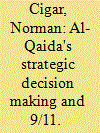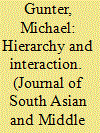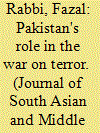|
|
|
Sort Order |
|
|
|
Items / Page
|
|
|
|
|
|
|
| Srl | Item |
| 1 |
ID:
130544


|
|
|
|
|
| Publication |
2014.
|
| Summary/Abstract |
As the united states draws down its military presence in Afghanistan, it is appropriate to revisit how the war was ignited and , in particular, Al-Qaida's role in that process. An understanding of Al-Qaida's thinking in preparing and executing this operations provides helpful insight into its decision making system and into its planning process in relation to both overall policy and, specifically, to its decision to launch the 9/11 operation in 2001.
|
|
|
|
|
|
|
|
|
|
|
|
|
|
|
|
| 2 |
ID:
130545


|
|
|
|
|
| Publication |
2014.
|
| Summary/Abstract |
More than 30 years after it was founded as a small, violent, and isolated Kurdish party advocating Marxist revolution and the creation of a pan-Kurdish state, the Kurdistan workers Party (Partiyzz Karkaren Kurdistan) or PKK has both spawned and/or inspired a plethora of Kurdish nationalist organizations in Turkey. The rise of Kurdish nationalism, demands for Kurdish constitutional and legal rights, and need to establish new organizational names and identities to substitute for that of the
"terro1ist"-designated PKK help explain this Kurdish organizational proliferation. To the extent that the PKK has ignited Kurdish democratic self-determination, this article will analyze the broadly-based, complementary dynamics ol the various Kurdish nationalist groups in Turkey created over the years by the PKK (KCK]. VV hat are its components? Why were they created? How do they interact with each other? How successful has this movement been? Specifically analyzed are the PKK, KCK, BDP and the DTK in Turkey; and in the European diaspora, KON-KURD, KGK, KNK, EUTCC, Pl K, and CAMPACC, among others. The tentative conclusion is that this Kurdish movement has enjoyed enough success to promise an eventual solution to the long-simmering Kurdish problem in Turkey along the lines of democratic autonomy or democratic self-determination and thus will be fair to all parties.
|
|
|
|
|
|
|
|
|
|
|
|
|
|
|
|
| 3 |
ID:
130546


|
|
|
|
|
| Publication |
2014.
|
| Summary/Abstract |
The 9/11 terrorist attack on the United States has put the Muslim world in general and Pakistan in particular in crisis.' Immediately after the attacks, President G.W. Bush announced that ?ghting against terrorists would be his administration's top priority: "America and our friends and allies join with all those who want peace and security in the world, and we stand together to win the war against terrorism." He added that the United States would "make no distinction between the terrorists who committed these acts and those who harbor them." He put conditions before the nations of the world
to stand with the US in its anti-terrorist efforts or face US wrath. "Every nation, in every region, now has a decision to make. Either you are with us, or you are with the terrorists." He also declared that "This is a great opportunity" and "We have to think of this as an opportunity."'
|
|
|
|
|
|
|
|
|
|
|
|
|
|
|
|
|
|
|
|
|